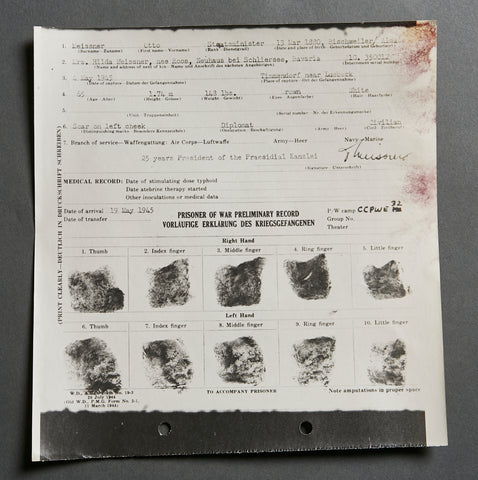German WWII Preliminary Record for POW Report for Otto Meissner-Otto Lebrecht Eduard Daniel Meissner was head of the Office of the President of Germany from 1920 to 1945 during nearly the entire period of the Weimar Republic under Friedrich Ebert and Paul von Hindenburg and, finally, under the Nazi government under Adolf Hitler. After the Second World War, Meissner was arrested by the Allies and interrogated as a witness during the Nuremberg Trials. In July 1947, he appeared as a character witness for the accused former State Secretary Franz Schlegelberger. Meissner was finally prosecuted in the Wilhelmstrasse Trial, but the court acquitted him on the 14th of April, 1947. Two years later, in May 1949, he was accused again, this time in Munich, and was adjudged a fellow traveler. His appeal was turned down, but the proceedings were called to a halt in January 1952. In 1950, Meissner published a memoir covering his unusual bureaucrat's career in a book, State Secretary under Ebert, Hindenburg and Hitler. He died at the age of 73, in 1953 in Munich.
Note: These are original vintage reprints of Prisoner of War Preliminary reports These are guaranteed as described. This paperwork would have been a prisoner “intake form”, with all of the individual’s personal details including the prisoner's name, fingerprints, place of birth, next of kin, date of capture, date of arrival, date of transfer, physical description, distinguishing marks, etc.
Copies of these would have been supplied to the different departments that needed access to this information. This is one of the vintage reprints that survived from the infamous Allied prisoner-of-war camp in the Palace Hotel of Mondorf-les-Bains, in Luxembourg, code named "Camp Ashcan". Each card is annotated "CCPWE #32", an abbreviation for the Central Continental Prisoner of War Enclosure #32. Operating from May to August 1945, it served as a processing station and interrogation center for the 86 most prominent surviving Nazi leaders prior to their trial in Nuremberg, including Hermann Göring and Karl Dönitz.




